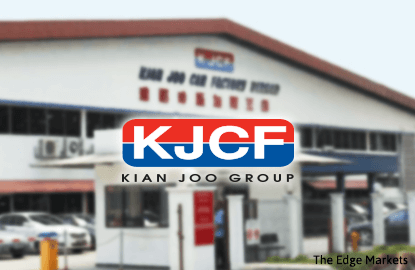
JUST when Kian Joo Can Factory Bhd’s (KJCF) minority shareholders thought that the long-delayed takeover bid launched by Aspire Insight Sdn Bhd for the aluminium can manufacturing business was finally going to materialise, the two companies dropped a bombshell.
KJCF announced in April that the company and Aspire Insight, in which the Employees Provident Fund (EPF) holds a 30% stake, had mutually agreed to terminate the proposed RM1.47 billion asset sale after two years and five months of waiting.
The reason given was that KJCF had “engaged with Aspire Insight for a better price for the proposed disposal in view of the improved performance of KJCF over the past two financial years”.
The can manufacturer explained in a filing with Bursa Malaysia that the company and Aspire Insight could not decide on the price. KJCF noted that the valuation of the company was different from that done in March 2014.
In a nutshell, KJCF’s board declined to sell the assets at RM3.30 per share, or RM1.47 billion. This is based on the assumption that its statement on engaging with Aspire Insight for a better deal meant that it had asked for a higher price.
To be fair, KJCF, which enjoys the lion’s share of the local aluminium can market, had seen its annual earnings on an upward trend in the past two years.
In its financial year ended Dec 31, 2015 (FY2015), KJCF’s net profit grew 8.6% to RM131.3 million, or 29.56 sen per share, from RM120.9 million, or 27.22 sen per share, the year before. Its net profit was RM118.3 million in FY2013, down from RM120.7 million the year before, on revenue of RM1.29 billion.
The company’s retained earnings had also expanded to RM1.15 billion as at Dec 31, 2015, from RM1.01 billion the previous year. Its cash pile had ballooned to RM181.2 million as at Dec 31, 2015, from RM123.4 million the previous year.
KJCF, however, posted a lower net profit of RM102.2 million in the nine months ended Sept 30 compared with RM107.8 million in the previous corresponding period. But its profit for the third quarter ended Sept 30 was higher at RM50.84 million compared with RM44.24 million previously. Its cash balance grew to RM216.5 million as at Sept 30 from RM198.89 million in the previous corresponding period.
Aspire Insight’s offer valued KJCF at 12.4 times its earnings and 1.4 times its net asset value. Applying the same valuation multiples, KJCF would be worth RM3.67 per share on price-earnings ratio or RM4.08 based on book value, according to its FY2015 earnings.
KJCF’s board might have done the right thing to bargain for the best valuation for the company’s assets. But the question is, did the board make an effort to seek an alternative offer for its prized assets?
There has been market talk that Toyota group’s trading arm, Toyota Tsusho Corp, is eyeing KJCF as well. The Japanese group could make a more generous offer, considering the sharp depreciation of the ringgit.
It is worth noting that KJCF once told investors that Aspire Insight was keeping its offer price at RM3.30 apiece when speculation was widespread that the latter might have to up its offer since KJCF’s earnings and balance sheet had improved.
In its announcement to Bursa, KJCF did not reveal its intention to negotiate a higher price. It only stated that an extension was needed as Aspire Insight required more time to do due diligence, which is understandable.
KJCF’s share price had been falling since late April but went up to RM3.35 in the days following the news that the deal has fallen through. But the upward momentum lasted just three days. The stock dipped below RM3 to RM2.77 — its lowest close since August 2013. As at last Friday, the stock had rebounded slightly to RM2.87.
Some quarters attribute the selling pressure to the termination of the deal that had supported KJCF’s share price all the while.
Meanwhile, the EPF, which had conducted due diligence on KJCF, has trimmed its stake in the company since Aspire Insight walked away from the deal. The provident fund reduced its equity interest to 8.57%, becoming the third largest shareholder in KJCF. It was once the second largest shareholder with a 10.03% stake.
Can-One Bhd remains the single largest shareholder in KJCF with a 32.9% stake, followed by Datuk See Teow Chuan (8.95%). KJCF managing director Yeoh Jin Hoe is the controlling shareholder of Can-One with a 26.98% stake.
The EPF’s move to reduce its stake in KJCF does not paint a positive picture of the company, considering that the provident fund had done due diligence on it. The share sale may be for commercial reasons but it still leaves a bad taste in the mouth of the minority shareholders.
Save by subscribing to us for your print and/or digital copy.
P/S: The Edge is also available on Apple's AppStore and Androids' Google Play.